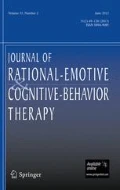Abstract
Two studies were conducted to examine the psychometric properties and correlates of the Perfectionism Cognitions Inventory (PCI) when administered to clinical samples. The PCI is a 25-item measure of automatic thoughts with themes involving perfectionism and beliefs that perfection should be attained. Analyses indicated that the PCI is unidimensional and it has adequate internal consistency. Correlational analyses confirmed that the PCI is associated with psychological distress and deficits in cognitive self-management, including lack of self-reinforcement, lack of a positive self-focus, and perfectionistic inflexibility. Moreover, tests of incremental validity revealed that the PCI accounts for unique variance in levels of anxiety and depression symptoms after removing variance attributable to trait perfectionism dimensions. Overall, the findings suggest that automatic thoughts involving perfectionistic themes can be assessed in a reliable and valid manner in clinical samples. Moreover, it is important to assess perfectionism cognitions as a supplement to trait perfectionism measures when evaluating the role of perfectionism in psychological distress and associated deficits in cognitive self-control.
Similar content being viewed by others
References
Beck A. T., Epstein N., Brown G., Steer R. A. (1988). An inventory for measuring anxiety: Psychometric properties. Journal of Consulting and Clinical Psychology 56:93–897
Beck A. T., Rush A. J., Shaw B. F., Emery G. (1979). Cognitive therapy of depression: A treatment manual. New York: Guilford
Beck A. T., Steer R. A., Garbin M. G. (1988). Psychometric properties of the Beck depression inventory: Twenty-five years of evaluation. Clinical Psychology Review 8:77–100
Berg N. (1971). Effects of alcohol intoxication on self concepts. Quarterly Journal of Studies on Alcohol 32:442–453
Blatt S. J. (1995). The destructiveness of perfectionism: Implications for the treatment of depression. American Psychologist 50:1003–1020
Blatt S. J., Quinlan D. M., Pilkonis P. A., Shea M. T. (1995). Impact of perfectionism and need for approval on the brief treatment of depression: The National Institute of Mental Health Treatment of Depression Collaborative Research Program revisited. Journal of Consulting and Clinical Psychology 63:125–132
Blatt S. J., Zuroff D. C. (2002). Perfectionism in the therapeutic process. In G. L. Flett, P. L. Hewitt (Eds.), Perfectionism: Theory, research, and treatment. (pp. 393–406). Washington, DC: American Psychological Association
Briggs S. R., Cheek J. M. (1986). The role of factor analysis in the development and evaluation of personality scales. Journal of Personality 54:107–148
Brown R. A., Evans D. M., Miller I. W., Burgess E. S., Mueller T. L. (1997). Cognitive-behavioral treatment for depression in alcoholism. Journal of Consulting and Clinical Psychology 65:715–726
Cernovsky Z. Z. (1989). Self-reinforcement scores of alcoholics. Advances in Alcohol and Substance Abuse 8:67–73
Ellis A. (2002). The role of irrational beliefs in perfectionism. In G.L. Flett, P.L. Hewitt (Eds.), Perfectionism: Theory, research, and treatment (pp. 217–229). Washington, DC: American Psychological Association
Enns M. W., Cox B. J. (2002). The nature and assessment of perfectionism: A critical analysis. In G. L. Flett, P. L. Hewitt (Eds.), Perfectionism: Theory, research, and treatment (pp. 33–62). Washington, DC: American Psychological Association
Ferrari J. R. (1995). Perfectionism cognitions with nonclinical and clinical samples. Journal of Social Behavior and Personality 10:143–156
Flett G. L., Greene A., Hewitt P. L (2004). Dimensions of perfectionism and anxiety sensitivity. Journal of Rational-Emotive and Cognitive-Behavior Therapy 22:37–55
Flett G. L., Hewitt P. L., Blankstein K. R., Gray L. (1998). Psychological distress and the frequency of perfectionistic thinking. Journal of Personality and Social Psychology, 75:1363–1381
Flett G. L., Madorsky D., Hewitt P. L., Heisel M. J. (2002). Perfectionism cognitions, rumination, and psychological distress. Journal of Rational-Emotive and Cognitive-Behavior Therapy 20:31–45
Frost R. O., Henderson K. J. (1991). Perfectionism and reactions to athletic competition. Journal of Sport and Exercise Psychology 13:323–335
Frost R. O., Marten P. A., Lahart C., Rosenblate R. (1990). The dimensions of perfectionism. Cognitive Therapy and Research 14:449–468
Frost R. O., Trepanier K. L., Brown E. J., Heimberg R. G., Juster H. R., Makris G. S., Leung A. W (1997). Self-monitoring of mistakes among subjects high and low in perfectionistic concern over mistakes. Cognitive Therapy and Research 21:209–222
Furlong M., Oei T. P. S. (2002). Changes to automatic thoughts and dysfunctional attitudes in group CBT for depression. Behavioral and Cognitive Psychotherapy 30:351–360
Gilberstadt H., Duker J. (1965). A handbook for clinical and actuarial MMPI interpretation. Philadelphia, PA: Saunders
Glantz M. D., McCourt W. (1983). Cognitive therapy in groups with alcoholics. In A. Freeman (Ed.), Cognitive therapy with couples and groups (pp. 157–182). NY: Plenum
Glass C. R., Arnkoff D. B. (1997). Questionnaire methods of cognitive self-statement assessment. Journal of Consulting and Clinical Psychology 65:911–927
Guidano V., Liotti G. (1983). Cognitive processes and emotional disorders. NY: Guilford
Haynes S. N., Lench H. C. (2003). Incremental validity of new clinical assessment measures. Psychological Assessment 15:456–466
Heiby E. M. (1983). Assessment of frequency of self-reinforcement. Journal of Personality and Social Psychology 44:1304–1307
Hewitt P. L., Flett G. L. (1991). Perfectionism in the self and social contexts: Conceptualization, assessment, and association with psychopathology. Journal of Personality and Social Psychology 60:456–470
Hewitt P. L., Flett G. L. (2004). The Multidimensional Perfectionism Scale: Manual. Toronto: Multi-Health Systems Inc
Hewitt P. L., Flett G. L., Sherry S. B., Habke M., Parkin M., Lam R. W., McMurtry B., Ediger E., Fairlie P., Stein M. (2003). The interpersonal expression of perfection: Perfectionistic self-presentation and psychological distress. Journal of Personality and Social Psychology 84:1303–1325
Hewitt P. L., Flett G. L., Turnbull-Donovan W., Mikail S. (1991). The multidimensional perfectionism scale: Reliability, validity, and psychometric properties in psychiatric samples. Psychological Assessment: A Journal of Consulting and Clinical Psychology 3:464–468
Hewitt P. L., Genest M. (1990). The ideal-self: Schematic processing of perfectionistic content in dysphoric university students. Journal of Personality and Social Psychology 59:802–808
Hewitt P. L., Norton G. R. (1993). The Beck anxiety inventory: A psychometric analysis. Psychological Assessment 5:408–412
Hewitt P. L., Norton G. R., Flett G. L., Callender L., Cowan T. (1999). Dimensions of perfectionism, hopelessness, and attempted suicide in a sample of alcoholics. Suicide and Life-Threatening Behavior 28:95–406
Hollon S. D., Kendall P. C. (1980). Cognitive self-statements in depression: Development of an automatic thoughts questionnaire. Cognitive Therapy and Research 4:83–395
Hull J. G. (1981). A self-awareness model of the causes and effects of alcohol consumption. Journal of Abnormal Psychology 90:86–600
Ingram R. E., Kendall P. C., Siegle G., Guarino J., McLaughlin S. (1995). Psychometric properties of the positive automatic thoughts questionnaire. Psychological Assessment 7:95–507
Ingram R. E., Wisnicki K. S. (1988). Assessment of positive automatic cognition. Journal of Consulting and Clinical Psychology 56:98–902
Kahler C. W., Ramsey S. E., Read J. P., Brown R. A. (2002). Substance-induced and independent major depressive disorder in treatment-seeking alcoholics: Associations with dysfunctional attitudes and coping. Journal of Studies on Alcohol 63:63–371
Kanfer F. H. (1971). The management of behavior by self-generated stimuli and reinforcement. In A. Jacobs, L. B. Sachs (Eds.), The psychology of private events (pp. 39–59). NY: Academic Press
Kanfer F. H., Hagerman S. (1981). The role of self-regulation. In L. Rehm (Ed.), Behavior therapy for depression: Present status and future directions (pp. 143–179). San Diego, CA: Academic Press
Katon W., Roy-Byrne P. P. (1991). Mixed anxiety and depression. Journal of Abnormal Psychology 100:37–345
Kendall P. C., Ingram R. E. (1989). Cognitive-behavioral perspectives: Theory and research on depression and anxiety. In P.C. Kendall, D. Watson (Eds.), Anxiety and depression: Distinctive and overlapping features (pp. 27–53). New York: Academic Press
Kline P. (1987). Factor analysis and personality theory. European Journal of Personality 1:1–36
Kwon S. M., Oei T. P. S. (1994). Roles of two levels of cognition in the development, maintenance, and treatment of depression. Clinical Psychology Review 14:31–358
Marks P. A., Seeman W., Haller D. L. (1974). The actuarial use of the MMPI with adolescents and adults. Baltimore, MD: Williams and Wilkins
Nerviano V. J., Gross H. W. (1983). Personality types of alcoholics on objective inventories: A review. Journal of Studies in Alcohol 44:37–851
Nolen-Hoeksema S. (1991). Responses to depression and their effects in the duration of depressive episodes. Journal of Abnormal Psychology 100:69–582
Radloff L. S. (1977). A self-report depression scale for research in the general population. Applied Psychological Measurement 1:85–401
Ramsey E. (1987). From guilt through shame to AA: A self-reconciliation process. Alcoholism Treatment Quarterly 4:7–107
Ramsey S. E., Brown R. A., Stuart G. L., Burgess E. S., Miller I. W. (2002). Cognitive variables in alcohol dependent patients with elevated depressive symptoms: Changes and predictive utility as a function of treatment modality. Substance Abuse 23:71–182
Rehm L. P. (1977). A self-control model of depression. Behavior Therapy 8:87–804
Robertson E. D., Fournet G. P., Zelhart P. F., Estes R. E. (1988). A factor analysis of the Kirton adaptation-inventory using an alcoholic population. Perceptual and Motor Skills 66:59–664
Rude S. S. (1986). Differential response to assertion and cognitive self-control treatments as a function of proficiency in each domain. Journal of Consulting and Clinical Psychology 54:90–394
Rude S. S. (1989). Dimensions of self-control in a sample of depressed women. Cognitive Therapy and Research 13:63–375
Rude S. S., Rehm L. P. (1991). Responses to treatment for depression: The role of initial status on targeted cognitive and behavioral skills. Clinical Psychology Review 11:95–514
Safren S. A., Heimberg R. C., Lerner J., Henin A., Warman M., Kendall P. C. (2000). Differentiating anxious and depressive self-statements: Combined factor structure of the anxious self-statements questionnaire and the automatic thoughts questionnaire-revised. Cognitive Therapy and Research 24:27–344
Sato R. A., Heiby E. M. (1992). Correlates of depressive symptoms among battered women. Journal of Family Violence 7:29–245
Schill T., Kramer J. (1991). Self-defeating personality, self-reinforcement, and depression. Psychological Reports 69:37–138
Shafran R., Cooper Z., Fairburn C. G. (2002). Clinical perfectionism: A cognitive-behavioral analysis. Behaviour Research and Therapy 40:73–791
Shafran R., Mansell W. (2001). Perfectionism and psychopathology: A review of research and treatment. Clinical Psychology Review 21:79–906
Sherry S. B., Hewitt P. L., Flett G. L., Harvey M. (2003). Perfectionism dimensions, perfectionistic attitudes, dependent attitudes, and depression in psychiatric patients and university students. Journal of Counseling Psychology 50:73–386
Snyder C. R., Crowson J. J., Houston B. K., Kurylo M., Poirer J. (1997). Assessing hostile automatic thoughts: Development and validation of the HAT scale. Cognitive Therapy and Research 21:77–492
Author information
Authors and Affiliations
Corresponding author
Additional information
This research was supported by major research grants from Health Canada and the Social Sciences and Humanities Research Council (SSHRC) of Canada to the first two authors, and a Canada Research Chair in Personality & Health awarded to the first author. The fourth author, Thomas Martin, is now deceased and this paper is dedicated to his memory.
Rights and permissions
About this article
Cite this article
Flett, G.L., Hewitt, P.L., Whelan, T. et al. The Perfectionism Cognitions Inventory: Psychometric Properties and Associations with Distress and Deficits in Cognitive Self-management. J Rat-Emo Cognitive-Behav Ther 25, 255–277 (2007). https://doi.org/10.1007/s10942-007-0055-4
Published:
Issue Date:
DOI: https://doi.org/10.1007/s10942-007-0055-4




